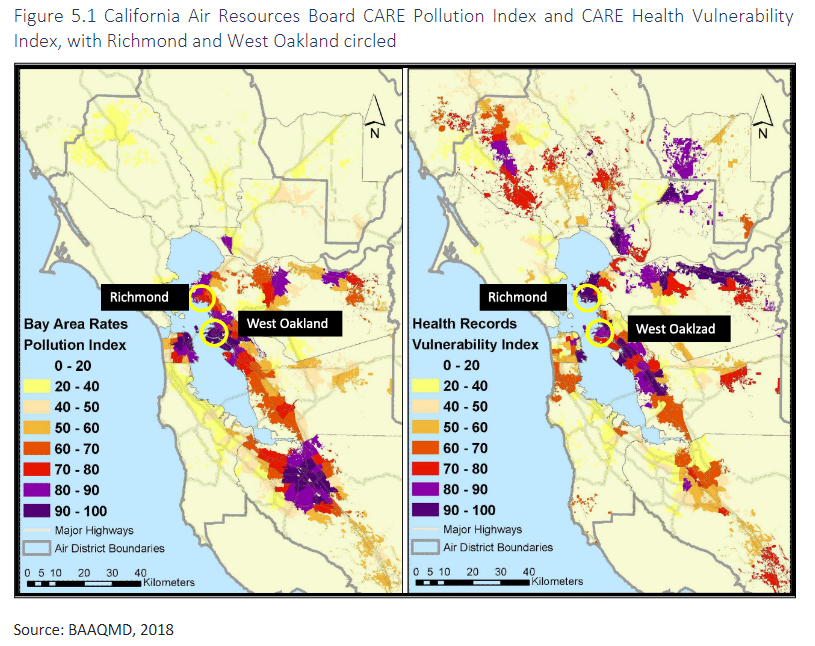Research report on coal in Bay Area finds alarming health and Environmental Justice impacts
A full report on scientific research conducted over the course of three years in Richmond, California greatly expands on a peer-reviewed paper about the spread of toxic PM2.5 pollution by coal trains (see New Proof: Coal Trains Spread Toxic PM2.5 Pollution in Richmond, CA for a summary and link to the paper). [The term “PM2.5” refers to particles in the air that are two-and-one-half microns wide or smaller; there are one million microns in a meter; one micron is approximately 1/25,000 of an inch.] The research was funded by a grant from the California Air Resources Board, and was conducted by Drs. Bart Ostro and Nicholas Spada of the UC Davis Air Quality Research Center, and Dr. Heather Kuiper, of Oakland, California.
The report, Assessment of Coal and Petroleum Coke Pollution: Air Quality, Health, and Environmental Justice, cites studies of effects on health of PM2.5 on six continents, linking dispersion of fugitive dust – including PM2.5 – from conveyance, storage, and handling of coal to numerous adverse health impacts. These include infant mortality; heart attacks; strokes; diabetes; asthma; adverse birth outcomes; neurodevelopmental effects; cognitive deficits in adults and children; and lung cancer.
While study of exactly how fugitive coal dust disperses through a community is ongoing, this report cites “studies [that] have reported impacts at very low concentrations of PM2.5” and for durations of as short as one hour. These impacts are multiplied many times over by years of exposure to which communities are subjected when they are adjacent to rail lines that ship coal, near railyards where coal trains are held for days or weeks at a time, or beside coal shipping terminals such as one developers propose to build next to the Bay Bridge Toll Plaza in Oakland and the already-existing Levin Terminal in Richmond.
An Executive Summary lists the following findings from research conducted between October 2019 and October 2022 (quoted from page v. of the report):
- Rail conveyance of coal significantly increases ambient concentrations of PM2.5
- Rail transit of unloaded cars increases ambient PM2.5 concentrations
- Storage of […] coal cars at the rail yard [east of Richmond’s Levin Terminal] significantly increases ambient concentrations of PM2.5.
- Terminal operations involving coal transport, storage, and handling, significantly increase community exposure to ambient PM2.5
- These [incremental increases in concentration of] PM2.5 … subsequently increase the risk of a wide range of adverse health effects with environmental justice implications for the exposed population, as the adverse effects are borne disproportionately by the most vulnerable, including infants, children and the elderly, people of color, those with low incomes, and those with underlying health conditions.
The three scientists who conducted and reported on this research presented their findings to the Oakland and Richmond communities in an online Town Hall on April 26, 2023. The Town Hall focused on dispersion of PM2.5 from coal trains but touched on the full report’s findings as well. A video of the Town Hall has been posted to YouTube; and the slide deck presented at the Town Hall by Dr. Bart Ostro is available as a PDF.
Following the Town Hall, the full report’s release, and a UC Davis Press Release, journalists reported on the research on KCBS Radio, on KQED Radio, in the San Francisco Chronicle, in CoalWire #464, and in the East Bay Express.
